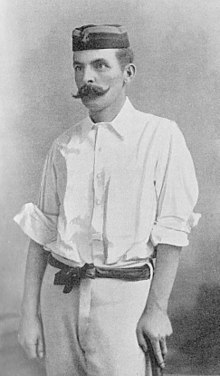A. G. Steel
 |
||||||||||||||||||||||||||||||||||||||||
| Personal information | ||||||||||||||||||||||||||||||||||||||||
|---|---|---|---|---|---|---|---|---|---|---|---|---|---|---|---|---|---|---|---|---|---|---|---|---|---|---|---|---|---|---|---|---|---|---|---|---|---|---|---|---|
| Full name | Allan Gibson Steel | |||||||||||||||||||||||||||||||||||||||
| Born |
24 September 1858 West Derby, Liverpool, Lancashire, England |
|||||||||||||||||||||||||||||||||||||||
| Died | 15 June 1914 (aged 55) Hyde Park, London, England |
|||||||||||||||||||||||||||||||||||||||
| Batting style | Right-handed | |||||||||||||||||||||||||||||||||||||||
| Bowling style | Right arm fast-medium / slow-medium | |||||||||||||||||||||||||||||||||||||||
| International information | ||||||||||||||||||||||||||||||||||||||||
| National side | ||||||||||||||||||||||||||||||||||||||||
| Test debut (cap 28) | 6 September 1880 v Australia | |||||||||||||||||||||||||||||||||||||||
| Last Test | 17 July 1888 v Australia | |||||||||||||||||||||||||||||||||||||||
| Domestic team information | ||||||||||||||||||||||||||||||||||||||||
| Years | Team | |||||||||||||||||||||||||||||||||||||||
| 1877–1893 | Lancashire | |||||||||||||||||||||||||||||||||||||||
| 1880–1890 | MCC | |||||||||||||||||||||||||||||||||||||||
| 1878–1881 | Cambridge University | |||||||||||||||||||||||||||||||||||||||
| Career statistics | ||||||||||||||||||||||||||||||||||||||||
|
||||||||||||||||||||||||||||||||||||||||
|
Source: CricketArchive, 23 September 2008
|
||||||||||||||||||||||||||||||||||||||||
Allan Gibson "AG" Steel (registered at birth as Alan Gibson Steel) (1858 –1914) was a Lancashire and England cricketer, who was reckoned by many in his day to be the equal of the legendary W G Grace.
Born 24 September 1858 in West Derby, Liverpool to Joseph Steel of Liverpool, and Kirkwood in Scotland, he was one of seven cricketing brothers and three of his brothers Ernest (EE), Douglas (DQ) and Harold (HB), also played first-class cricket for Lancashire. After his schooldays at Marlborough College, where he played cricket superbly, he proceeded to Trinity Hall, Cambridge. He was an instant star in the Cambridge University side of 1878 where he topped the bowling averages for the whole of England as a freshman. According to HS Altham, "it was unquestionably A.G. Steel's bowling that made the difference between a good and a great eleven".
Steel played in the first ever Test Match in England at The Oval in 1880, then in the famous Test which England narrowly lost in 1882. The mock obituary was published in The Sporting Times saying "R.I.P. English Cricket...the body will be cremated and the Ashes will be taken to Australia."
Soon after Steel set off for Australia with his Cambridge University friends Ivo Bligh and the Studd brothers George and Charles, and a team they had put together. They toured Australia in 1882–1883 and won the agreed series 2–1, thus being given a small urn. They are commemorated by the poem inscribed on the side of the urn:
Steel scored 135 at the Sydney Cricket Ground in a Fourth Test match arranged as an "extra" on that tour, in 1883. Over the whole tour he topped both the batting and the bowling averages.
...
Wikipedia
